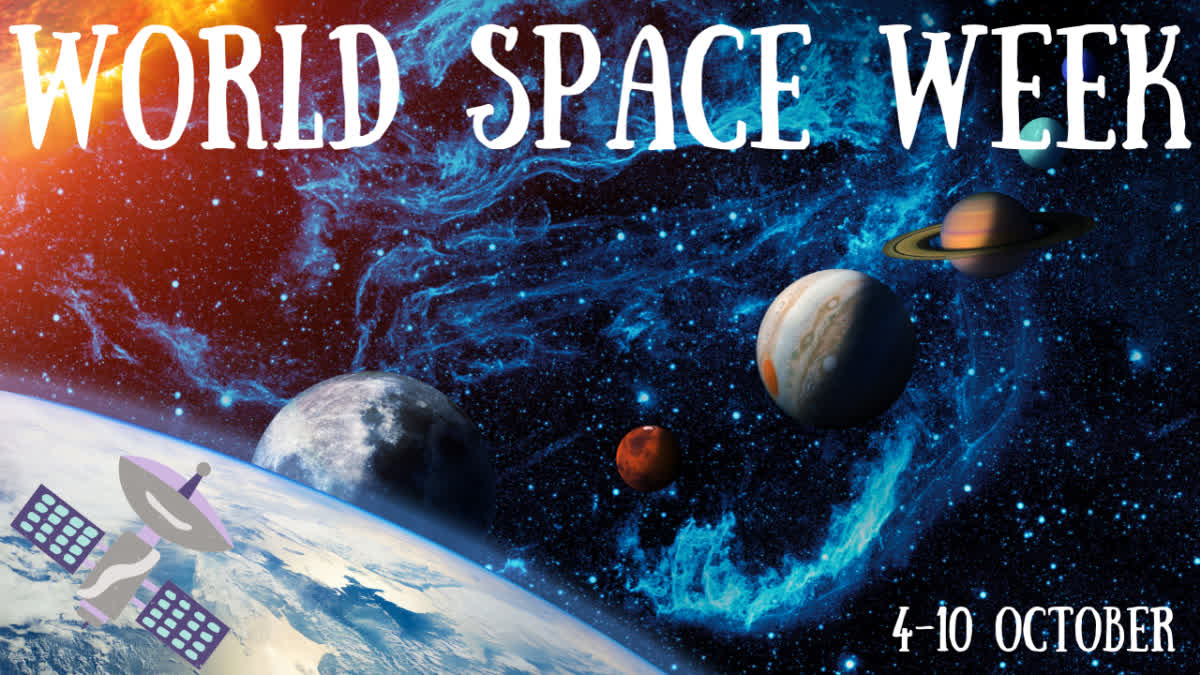Hyderabad: The World Space Week, observed annually from October 4 to 10 across the globe, is a testament to humanity's fascination and engagement with the cosmos. This international observance is celebrated in nearly 100 countries worldwide and stands as the largest space event.
The United Nation's initiative promotes manifold benefits of science and technology to human society. It was officially recognised by the United Nations General Assembly on Dec 6, 1999. The purpose of World Space Week is to educate and enlighten the world about the extensive advantages that the human race derives from space exploration.
Background- On Oct 4 1957, the launch into outer space of the first human-made Earth satellite, Sputnik 1, opened the door for space exploration. This event marked the beginning of a new era in space exploration, setting the stage for the monumental achievements that followed.
A decade later, on 10 October 1967, the Treaty on Principles Governing the Activities of States in the Exploration and Use of Outer Space, including the Moon and Other Celestial Bodies came into being.
Space science and technology have progressively supported various United Nations activities. More than 25 United Nations entities and the World Bank Group routinely employ space applications to contribute significantly to the organisation's work, including the implementation of recommendations from major world conferences and UNISPACE III.
The annual Inter-Agency Meeting on Outer Space Activities serves as a pivotal platform to synergise these efforts. Since 2004, an open informal session has been held following the meeting to enhance engagement with member states on important space-related developments.
History- Commencing on October 4, which coincides with the launch of Sputnik 1 in 1957, and concluding on October 10, the date on which the Treaty on Principles Governing the Activities of States in the Exploration and Peaceful Uses of Outer Space, including the Moon and Other Celestial Bodies was signed. The first celebration of World Space Week took place in 2000 under the theme 'Launching the Space Millennium.' Over the years, this event has grown substantially. The 2021 edition witnessed a record-breaking scale with more than 6,418 events observed in 96 nations.
Theme- The theme for World Space Week 2023 is set as 'Space and Entrepreneurship', which emphasises on the importance of the commercial space industry. This theme acknowledges the growing opportunities for space entrepreneurship and the new benefits of space brought about by space entrepreneurs. With miniaturisation and decreasing launch costs, it is now possible for a small business to build and launch a small satellite, and for entrepreneurs to create valuable new data products for governments and industry.
Key facts about World Space Week-
- The largest space event- This annual event, observed in over 95 countries, encompasses about 6,000 events every year, making it the largest space event globally.
- Accumulated space junk- Scientists estimate there are about 500,000 pieces of space junk today, which are mostly fragments from rockets and satellites.
- Shooting stars are falling rocks- Shooting stars are really small pieces of rocks or dust that hit Earth's atmosphere from space — they move so fast that it heats up and burns.
- Our solar system's age- Our solar system, as estimated by scientists, is an astounding 4.57 billion years old.
World Space Week celebrations 2023 in India- In Kerala, World Space Week 2023 will be observed by the Indian Space Research Organisation (ISRO) in a distinctive manner. The Thiruvananthapuram unit of the Space organisation is organising a painting competition for Kerala school students on Sunday. The event will be held across four different zones - Thiruvananthapuram, Ernakulam, Thrissur, and Kannur - in the State.
ISRO's achievements- India's space achievements have made a significant mark on the global stage. The ISRO, in its journey of advancements, successfully launched Aryabhata, India's first satellite, in 1975, via a Russian-made rocket from Baikonur Cosmodrome spaceport.
Milestones such as the first sounding rocket (an instrument-carrying rocket designed to take measurements and perform scientific experiments during its sub-orbital flight) launch in 1963, the experimental launch of SLV-3 in 1979, and the launch of the APPLE satellite in 1981 further established India's prowess in space exploration.
The historic achievement of placing a spacecraft around the Moon in 2008 and the recent successful Chandrayaan-3 mission, making India the fourth country to soft land a spacecraft on the moon. Also, the successful launch of the Aditya-L1, the first solar observatory mission are testaments to ISRO's dedication and success in space exploration.
On a global scale, NASA, the United States' space agency, has accomplished monumental feats that have significantly contributed to our understanding of the cosmos.
NASA's 10 greatest achievements in Space-
- Apollo 11, a Walk on the Moon
- Freedom 7, the First American in Space
- The Mars Science Laboratory, a Rockhound on the Red Planet
- The Apollo 8 Mission, a Lunar Christmas Eve
- The Space Shuttle, a Reusable Spacecraft
- Apollo 13, Brilliance at Mission Control
- The Juno Spacecraft, a Trip to Jupiter
- Chandra X-ray Observatory, the High-energy Universe
- Hubble Space Telescope, the Universe Unveiled
- Explorer 1, the First U.S. Satellite
World Space Week serves as a powerful reminder of the remarkable strides humanity has made in exploring and understanding the universe. It celebrates not only the historic achievements in space exploration but also the potential for future advancements and the benefits they can bring to our lives on Earth.



